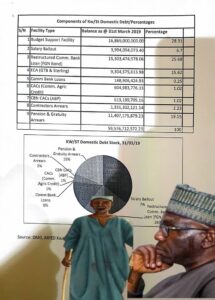On Gratuities: Setting the Records Straight. Wasiu Odewale
 The recent response by the Chief Press Secretary to Governor AbdulRahman AbdulRazaq, Mr. Rafiu Ajakaye, to the valid concerns raised by the Archbishop of Kwara Anglican Province, Most Rev. Israel Amoo calls for clarification. At the funeral of the late Chief Cornelius Olatunji Adebayo, former Governor of Kwara State, held at Oke Onigbin on Saturday, October 11, 2025, the respected cleric rebuked the Governor over the suffering of pensioners in the state and the deplorable condition of our roads, particularly in rural areas.
The recent response by the Chief Press Secretary to Governor AbdulRahman AbdulRazaq, Mr. Rafiu Ajakaye, to the valid concerns raised by the Archbishop of Kwara Anglican Province, Most Rev. Israel Amoo calls for clarification. At the funeral of the late Chief Cornelius Olatunji Adebayo, former Governor of Kwara State, held at Oke Onigbin on Saturday, October 11, 2025, the respected cleric rebuked the Governor over the suffering of pensioners in the state and the deplorable condition of our roads, particularly in rural areas.
In his hurried reaction, Mr. Ajakaye claimed that Governor AbdulRahman AbdulRazaq inherited gratuity arrears dating back to 2008 and that his administration had paid “over ₦20 billion” to date. This assertion is misleading and contrary to verifiable records. According to the official Kwara State Domestic Debt Stock report submitted during the handover in May 2019 by the Abdulfatah Ahmed administration, the total pension and gratuity arrears stood at ₦11,407,175,879.23 as at March 31, 2019, not “over ₦20 billion since 2008” as claimed by the CPS. ( see the attached KwS Debt Stock as at 31/03/2019).
It is true that gratuity obligations grow annually as more civil servants retire, but payment depends on the commitment and priority given to retirees’ welfare by any administration. The Kwara State 2024 approved budget reflected an opening balance of ₦26.55 billion, yet gratuity arrears remained at about ₦10 billion, funds the government could easily have cleared if retirees’ welfare mattered to the Governor at all.
By 2025, despite unprecedented inflows from the Federation Account (FAAC), the state’s budget opening balance again rose sharply to ₦62.2 billion, yet arrears climbed to ₦13.63 billion (see pages 12 and 36 of the Kwara State 2025 Approved Budget attached). If the government indeed prioritised pensioners, why are gratuity arrears rising despite such huge balances?
To further illustrate the scale of government resources, it is important to note that in 2023, 2024, and 2025 the Kwara State approved budgets stood at ₦257.6 billion, ₦509.9 billion, and ₦584.7 billion respectively, figures unprecedented in the state’s history. Where have these enormous budget sizes gone? What has been achieved with such resources that citizens can point to as evidence of good governance?
The 2025 Kwara State approved budget stands at ₦584.69 billion, with internally generated revenue (IGR) projected at ₦97.37 billion—an average of ₦8.1 billion monthly. In addition, the state receives an average of ₦12.8 billion monthly from FAAC, bringing total monthly inflows to over ₦20 billion. By conservative estimates, Governor AbdulRazaq’s administration has received over ₦1.8 trillion from FAAC, IGR, bonds, loans, aids, and grants in the last six and a half years. Yet, retirees languish without their entitlements, and critical infrastructure, especially rural and urban roads, remain in deplorable conditions.
Kwarans deserve honest answers. How much exactly has been spent on gratuities, and why do arrears continue to rise? Why is the agreed minimum wage not fully implemented in Kwara despite record revenues? Why are our rural and urban roads death traps? Why has Kwara, once celebrated as the State of Harmony, descended into fear and sorrow for its citizens? And how much has been spent, transparently, on projects such as Kwara Hotel renovation, Kwara Revenue House, International Conference Centre, Innovation Hubs, Kwara Garment Factory, Ahmadu Bello House Gate, and Kwara Express, which have little or no direct bearing on citizens’ welfare?
The Archbishop’s admonition reflects the cry of thousands of pensioners and citizens suffering the consequences of misplaced priorities. Instead of lies, propaganda and inflated figures, what Kwarans need is transparency, accountability, and above all, empathy from their government. Governor AbdulRahman AbdulRazaq owes the people clear explanations on how the enormous resources entrusted to his administration have been deployed, and why the welfare of retirees and the basic infrastructure needs of the state remain neglected.
Odewale was the Commissioner of Planning and Economic Development under former Governor Abdulfatah Ahmed.

